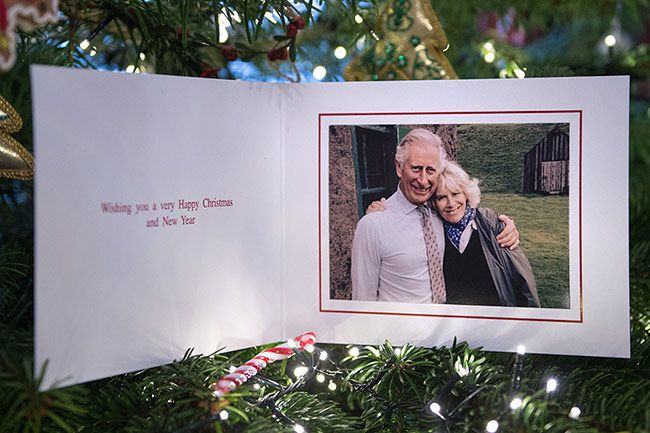When it comes to Christmas cards, Prince Charles should know better
The Duke and Duchess of Cornwall's 2017 Christmas card (Getty Images)
The fashion for people putting photos of themselves on their cards is at odds with what Christmas is truly about
I am becomingly increasingly hostile to the fashion for people putting images of themselves and families on Christmas cards. Even the royals now do it.
Christmas is about the dawn of redemption and the child in the manger, not about ourselves. The overwhelming majority of cards now on sale are secular, but robins, snow, carol singers and Santa at least have some loose connection with the feast of Christmas. I cannot see that promulgating photographs of oneself has anything whatever to do with it. Whenever Prince Charles or Prince William do it, I reflect that as future Supreme Governors of the Church of England they should know better.
Each year I give Christmas cards to my fellow performers in pantomime and one year, one of the girl dancers, who was in her mid-teens, cried out with delight: “Oh, look. A real Christmas card! It’s the Baby Jesus!” Clearly it must have been a long time since she had received a card of that nature.
“A real Christmas card!” That artless exclamation sums up just how secular the celebration of Our Lord’s birth has become, when anything connected with its meaning is seen as a rarity. Nor does that apply only to the cards themselves but also to the wording inside.
“Season’s Greetings” has replaced even “Merry Christmas”, let alone anything more prayerful or connected with the birth of Christ. Towards the end of my time in Parliament I was finding it difficult to reconcile myself to the official House of Commons cards, which of course, people love receiving. Diversity and not offending other faiths had become the watchwords.
Of course those who practise other faiths are not offended. They have their own feasts and know that we Christians have ours, but this silliness was taken to extremes in 2000 when it was proposed that the millennium celebrations should be held without a prayer or any mention of what the 2,000 years actually marked. Mercifully the Established Church rebelled and did so successfully.
My own Christmas cards come these days from a firm specialising in clerical stationery, Thomas Leach, in Abingdon. The picture on the front is always Nativity-related and last year it was the Three Wise Men. Crucially, inside is a verse from the Bible and a prayer that God may bless the recipient. I send the cards to Muslim, Jewish and atheist friends alike and none has yet objected.
I have a sense of humour and do not think all Christmas cards should be serious. I used to send my vicar brother a funny one every year but it was always related to the Christmas story. One I particularly treasured was of the Wise Men anxiously conferring, with the camel’s hoof pointing resolutely at the star. Nevertheless, when surveys reveal that only one in 80 Christmas cards features the Gospel story, we have to ask ourselves what, apart from too much food and too many presents, are we supposed to be celebrating?
There is, of course, nothing new about this but now an unpleasant trend is creeping in: that of vulgar and even obscene Christmas cards, effectively mocking the festival. Some are specifically intended to be anti-Christian as opposed to merely coarse. Can anybody imagine a similar reaction to other religious festivals, such as Eid or Diwali? Where will it stop? Easter cards mocking the Crucifixion?
Last year I searched high and low among the advent calendars in WH Smith for a specifically religious one rather than those offering chocolates. My quest being fruitless, I applied to the staff for help. Oh, yes, I was told, of course they were in stock, but on a separate stand, which needless to say was less prominent, as if somehow such calendars are the poor relations offering nothing but the holy message.
Such observations as I have made are echoed by one commentator or other every year, but the problem is that soon the meaning of Christmas will be a distant memory – and between now and next year’s festival these issues will seem irrelevant. Nobody will focus on them until the cards have long been printed, catalogued and prepared for sale. So maybe we should return to the subject throughout the year. After all, the Post Office supplies religious stamps because there is a demand for them. So why shouldn’t card manufacturers take a similar attitude to their sales?
Being away in pantomime this year, I haven’t yet opened any cards, which instead are piling up at home. Out of curiosity I shall perform an analysis of their content and hope that I shall have a better score than one in 80 having a religious theme. Last year that was about the ratio, despite all my friends knowing of my belief, and indeed many of them sharing it.
Ann Widdecombe is a novelist, broadcaster and former prisons minister

No comments:
Post a Comment